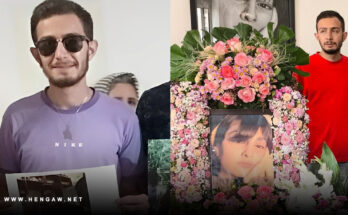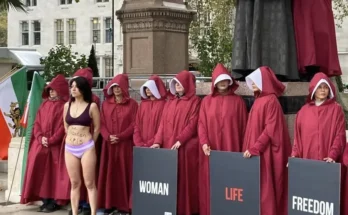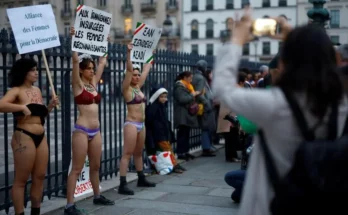![]() By Niloufar Goudarzi
By Niloufar Goudarzi
Source: Iran International

A government billboard in Tehran encouraging young girls to be homemakers and mothers has sparked a social media backlash amid the country’s violent oppression of women.
The poster, at Valiasar Square in Tehran for Iran’s National Girl’s Day, depicts a girl sweeping the house, feeding a baby, massaging her father, and helping her brother, titled “The light of the eye,” a term of endearment in Farsi.
It comes while there has been a new wave of crackdowns to compel women to comply with compulsory hijab laws under a new initiative called the “Noor [light] Initiative.” A user on the X social network wrote, “The irony of the Noor Initiative patrol vans being parked under the same billboard to arrest the ‘the light of the eye’.”
The juxtapositioning of the poster has fueled the anger, the area in front of the billboard mainly used as a parking space for morality police vans to enforce hijab on women passing by in Valiasr, one of the capital’s main squares.
Since the launch of Noor, social media has been flooded with videos of morality police violence against women rebelling against the hijab. There have also been allegations of police officers extorting money from women in exchange for leniency, as well as accusations of theft and sexual harassment.
Since Saturday morning when Iran’s “morality” police started a fresh round of crackdown on women removing their hijab, @IranIntl has obtained several videos showing violent arrests of women with “improper” hijab.
This one’s from eastern Tehran.pic.twitter.com/ymFX3S2ydy— Iran International English (@IranIntl_En) April 17, 2024
Several social media users have written that the girl “The light of the eye” is introduced in this banner. Still, if the same girl, “showing a bit of hair,” sets foot outside the house, “she will become a thorn in the eye of the regime and will be taken into those vans at the bottom of the picture.”
Some users shared pictures of women killed during the 2022 Woman Life Freedom movement, such as Mahsa Amini, Nika Shakarami, Sarina Alizadeh, and . They said that the government of the Islamic Republic is celebrating the day of the girls while “for no other reason than their hair, they torture, rape and kill them.”
The death of 22-year-old Amini in morality police custody sparked the months-long nationwide protests. During the movement, regime forces killed around 550 protesters, injured hundreds, and arrested over 22,000 people.
Amid widespread concerns over the breakout of a war between Iran and Israel, the Islamic Republic’s morality police have intensified crackdowns on hijab violations in the streets as of today, videos obtained by @IranIntl show.
This video shows Tehran’s Valiasr Square on Saturday.… pic.twitter.com/j8JLIIZuxL— Iran International English (@IranIntl_En) April 13, 2024
Many progressive Iranians criticized the outdated portrayal of women in a country in which women have fought for their right to education. “Couldn’t you show a girl playing sports, studying, having fun, or hanging out with her family?”
Between 2011 and 2022, women outnumbered men on Iran’s college and university campuses, yet women in the labor force accounted for only 19 percent in 2020. The government has made “systematic efforts to limit women’s access to the workplace,” according to a 2021 State Department report. The women who are employed reportedly earn 41 percent less than men for the same work.
Iranian leaders have stated numerous times that the primary function of women in society is to bear children, raise children, take care of the household, and serve their husbands.
The wife of Iran’s President, Ebrahim Raisi, said it is an example of violence when women study and work like men in an interview with Venezuelan state TV. Jamileh Alamolhoda claimed, “We want women to remain women. Why should we be like men? Why should we study, work or live like men? This is a form of violence”. She has continued to call the murder of Mahsa Amini “fake media hype”.
As Iran’s Islamic government tightens its grip on enforcing mandatory hijab, @IranIntl is receiving reports of extortion and abuse of Iranian women at the hands of hijab enforcement officers.https://t.co/9AumfS20be pic.twitter.com/v7lSMwXs4P
— Iran International English (@IranIntl_En) April 23, 2024
During a meeting with women in December, Supreme Leader Ali Khamenei reiterated his views that holding a job shouldn’t prevent women from carrying out their “actual duties.” “There is, however, a crucial requirement that women won’t be ‘deprived’ of that important and fundamental ‘feminine task’, housekeeping and childbearing,” Khamenei said.
Just months ago, the United Nations branded Iran’s new laws on hijab ‘gender apartheid’ and rights groups such as Amnesty International have slammed the regime’s ongoing gender-based oppression and violence.




